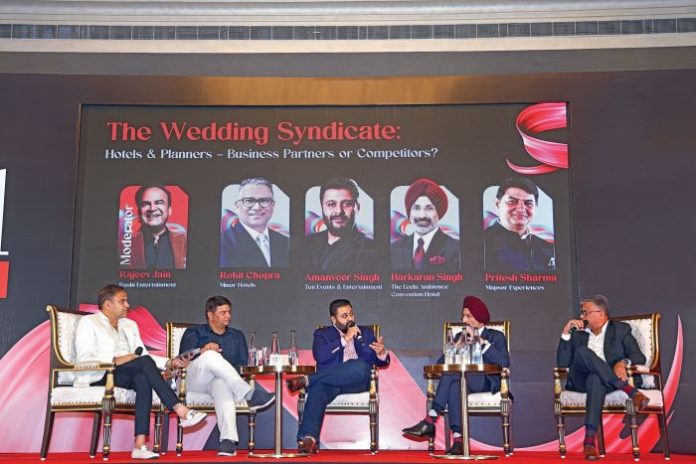At the Travel Wedding Show, experts highlighted key debates on travel agent commissions, revenue-sharing and licensing, determining need for fairness, transparency and collaboration.
Janice Alyosius
As India’s wedding industry grows more competitive, the relationship between hotels, wedding planners and event managers continues to evolve. The recent Travel Wedding Show organised at Anantara Jewel Bagh Jaipur ascertained the need for stronger collaboration. One of the key discussions at the event revolved around Travel Agent Commissions (TAC), revenue-sharing models and licensing complexities. Industry experts debated the changing dynamics of TAC, fair commission structures and external catering policies, shedding light on the challenges and opportunities that will shape the future of wedding industry and partnerships.
Significance of TAC
Explaining the indispensable role of TAC in their operations, Pritesh Sharma, Director, Mapsor Experiential Weddings, stated, “TAC is a crucial part of our business, especially at Mapsor, where we operate two divisions—hotel deals and wedding planning. For our hotel division, TAC is the foundation of our business.”
However, Rajeev Jain, Founder and Director, Rashi Entertainment, pointed out a growing issue in the industry. He stated, “Hotels have become greedy. Earlier, they offered 10 per cent on room bookings. Then ITC introduced 10 per cent commission on food. Later, Leela reduced it to 5 per cent on rooms. There is a lot of money-driven competition among hotels.” Sharma further added, “If hotels do not offer TAC, we do not do business with them. This is a critical aspect for any businessman, event manager, or wedding planner. We must treat each other as partners and follow better business practices.”
Fair commission practices
A significant concern discussed was the fairness of commission structures. Amanveer Singh, Managing Director, TEN Events & Entertainment, highlighted discrepancies in commission calculations as he informed, “If a room is sold for `1,40,000, it may be listed at `40,000, with 10 per cent commission on that amount. Breakfast charges might be deducted and 60-80 per cent of the revenue goes toward food, rentals and other expenses. The distribution of earnings must be fair, and commissions should apply to total revenue-whether at 5 per cent, 10 per cent or 15 per cent.”
With new luxury hotels entering markets such as Jaipur and Udaipur, Jain underscored the necessity for hotels to recognise planners as key business drivers as he stated, “Seven new hotels are opening in Jaipur, three in Udaipur. Ritz-Carlton and Fairmont are entering the market. Hotels need to view us as partners who drive their profitability.”
PPL and IPRS for weddings
The discussion also touched upon the complications surrounding PPL (Phonographic Performance Limited) and IPRS (Indian Performing Rights Society) licensing.
While these licenses are often mandated for corporate events, their applicability to weddings remains debated.
Sharma clarified, “In Rajasthan, particularly Jaipur, this is not a major issue for weddings. However, for corporate events in Udaipur, it is already a significant challenge. Multiple licenses—PPL, IPRS, NOEX, etc. are required, complicating the process. Weddings should not be subject to such process of acquiring licenses.”
Jain reinforced the legal standpoint, “Under Section 52(1)(za) of the Indian Copyright Act, 1957, social events, including weddings are exempted from licensing requirements. Hotels must recognise this provision. No licensing authority can issue a specific wedding license. If they attempt to do so, their legitimacy will be questioned.”
External catering models
The role of external caterers in hotels also surfaced as a key topic. Rohit Chopra, Area Commercial Director, India, Minor Hotels, acknowledged industry challenges, “Hotel chains follow specific SOPs for external caterers due to hygiene concerns. If an organiser signs an LOA (Letter of Agreement), we can explore options, especially for niche cuisines such as Sindhi or Marwari.”
Jain added, “Internationally, we allow external caterers for celebrations, provided they meet hygiene regulations and sign documentation.”
Amanveer noted a crucial distinction in pricing models, “When we host events internationally, hotels do not impose exorbitant minimum food revenue requirements. In India, hotels often push higher revenue targets for weddings, which leads to food wastage.”
He elaborated, “A 250-room hotel may mandate lunch and dinner for 500 guests per meal. Clients are forced to pay, while additional catering options are added separately. This results in nearly seven times the required food being prepared per meal, much of which goes to waste. Instead of focusing on biodegradable waste disposal machines, hotels should reduce waste and lower revenue demands.”
Approach to partnerships
Sharing their strategy in working with wedding planners, Harkaran Singh, General Manager, The Leela Ambience Convention Hotel, said, “The main challenge arises when we are not on the same page. When we collaborate, the process is smooth. Mutual respect is key.”
On PPL and IPRS, he echoed industry frustrations advocating that acquiring licenses does not benefit anyone. He said, “Despite the Wedding Act exemption, dealing with PPL and IPRS representatives mid-event is challenging. Hotels brands manage someone else’s assets and legal notices cause concern for owners and brands.”
Future of TAC
Summing up the discussion, Jain posed a key question, “Do you think being a commissionable business helps event management companies grow?” Amanveer responded, “I believe the commission is our right when we bring business to a hotel. If I drive revenue, I deserve a commission. However, my business model is transparent—I work on a fee-based structure, not hidden commissions.”
With rising competition and pricing fluctuations, he noted, “Hotels must prioritise service excellence over unnecessary add-ons. The inflationary pricing model is unsustainable. However, an inclusive approach—welcoming both established planners and startups—is a positive shift in the industry.” As the wedding and hospitality sectors evolve, insights from this discussion reinforce the need for transparency, collaboration and a more balanced approach in hotel-wedding planner relationships.
Under Indian Copyright Act, 1957, social events, including weddings are exempted from licensing requirements
Internationally, hotels do not impose exorbitant minimum food revenue requirements












